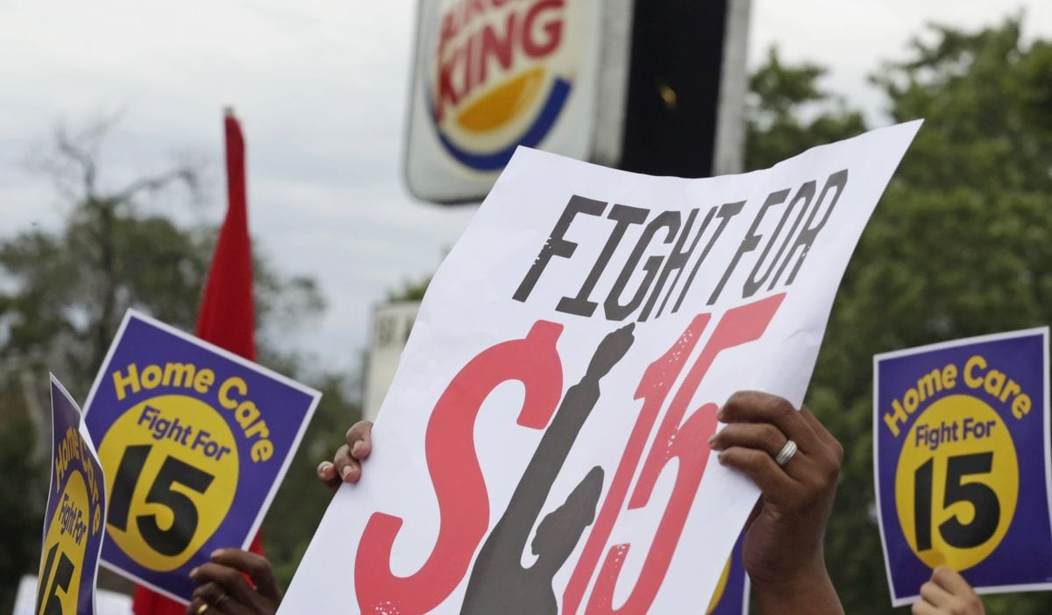Last month, NBC News reported on the rise of robots in the workforce, claiming that, “Robots could take over 20 million manufacturing jobs around the world by 2030.” Anyone who has been inside a McDonalds over the last several years can attest that “robots” are replacing the fast-food workforce too. Last month also saw the news that “House Dems are on the brink of minimum wage victory,” according to Politico. And if you don’t think that those two stories have anything to do with each other, you don’t understand basic economics or history.
First, a little history lesson.
Minimum wage laws began rearing their ugly little heads at the beginning of the 20th century when racist white people began to worry about people of color taking their jobs. For example, in 1925 a minimum wage was instituted in British Columbia with the racist goal of pricing Japanese immigrants out of the lumber industry’s job market. Likewise, in 1931 the U.S. Congress passed the Davis-Bacon Act as a racist means to keep African-Americans out of union-controlled job markets.
During the peak of The Great Migration in the 1920s, northern cities were flooded with hardworking black men looking to make a better life for their families. Racist union bosses and their racist union members understood that the hardworking newcomers posed a problem. And so, here comes the brief economic lesson portion of this article:
Say that the factory owner pays Worker A $10 an hour to make 100 widgets an hour. Worker B comes along, who is less skilled at making widgets than Worker A because he hasn’t had the training nor the experience. However, Worker B realizes that something is better than nothing and understands that as his efficiency improves, so will his pay. So, Worker B goes to the factory owner and says, “Hey, Mr. Factory Owner, I can promise to make 75 widgets an hour and you only have to pay me $5 an hour.”
In that scenario, what do you think Mr. Factory Owner is going to do?
Of course, he’s going to replace Worker A with Worker B. To be sure, his factory’s output will decline, but his profit margin will improve. Now imagine that thousands upon thousands of Worker Bs showed up, because that’s exactly what was happening during the 1920s. Except racists took matters into their own hands and made it harder for factory owners to hire African Americans.
Oh, how proud those early 20th century racists would be of this current crop of “woke” Democrats.
At $15 an hour, fast-food workers are woefully inefficient producers considering the price-point of the products they’re producing. That’s simple math. If given the option, fast-food franchise owners will replace an inefficient labor force with an efficient labor force. Technology is doing just that — providing owners an efficient labor force of “robots” to replace the human labor force made inefficient by minimum wage laws.
However, there’s another side to all of this: the increase of income inequality. NBC’s article reveals that “While researchers predicted the rise of robots will bring about benefits in terms of productivity and economic growth, they also acknowledged the drawbacks that were expected to arise simultaneously.”
Someone will be needed to produce, program, and maintain all of this fancy A.I. that’s taking over menial jobs. And that someone will be a small but privileged group of highly skilled and trained people. Money will continue to made hand over fist, but fewer people’s hands and fists will be involved. Lest you think I’m making this up, read what else NBC had to say:
“As a result of robotization, tens of millions of jobs will be lost, especially in poorer local economies that rely on lower-skilled workers. This will therefore translate to an increase in income inequality,” the study’s authors said.
However, if robot installations were boosted to 30% more than the baseline forecast by 2030, researchers estimated it would lead to a 5.3% boost in global GDP that year.
“This equates to adding an extra $4.9 trillion per year to the global economy by 2030 (in today’s prices) — equivalent to an economy greater than the projected size of Germany’s,” the report said.
Look, as a privileged white person, I should be all for minimum wage laws. Owing to my family’s income bracket, my children have access to the best schools, exclusive STEM camps, and a host of other opportunities made much easier to unlock due to our wealth. My STEM-loving kids will likely be counted among the few that benefit from that “extra $4.9 trillion per year” predicted by the study referenced in NBC’s report. But I’m not for minimum wage laws because I’m not greedy and selfish and I want to see all of humanity flourish.
There are ways to help promote innovation and the ensuing economic windfall associated with it as well as protect entry-level jobs that are important to help those in the lower-income brackets climb out of the cycle of poverty. However, minimum wage laws do the opposite by incentivizing factory owners and fast-food franchise owners to replace entry-level jobs with automation.
By promoting minimum wage laws, Democrats are disproportionately hurting minority communities while ensuring that the world’s growing wealth will be held by fewer and fewer people.









Join the conversation as a VIP Member